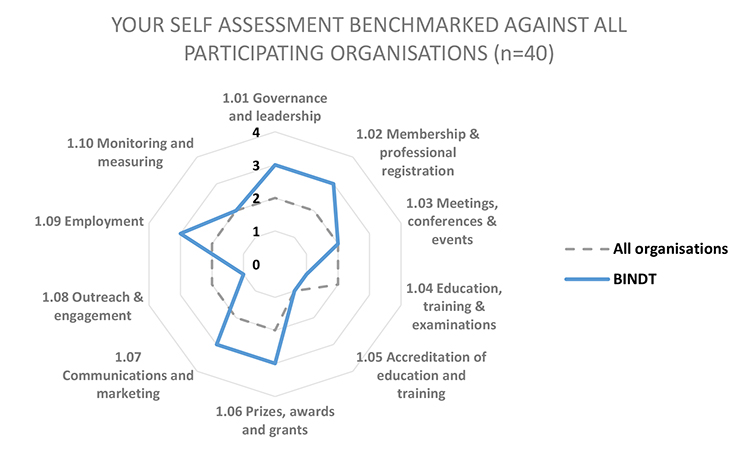Diversity and Inclusion Progression Framework
2021 Benchmarking Report
 The 2021 Diversity and Inclusion Progression Framework was developed in a collaboration between the Royal Academy of Engineering (RAEng) and the Science Council with the aim of helping professional bodies track and plan progress on diversity and inclusion.
The 2021 Diversity and Inclusion Progression Framework was developed in a collaboration between the Royal Academy of Engineering (RAEng) and the Science Council with the aim of helping professional bodies track and plan progress on diversity and inclusion.The Progression Framework sets out four levels of good practice on diversity and inclusion in ten areas of activity of professional engineering institutions (PEI) and scientific bodies, and provides a framework for data collection on diversity and inclusion.
| The ten areas of activity are: | The four levels of good practice are: |
| 1. Governance and leadership | Level 1: Initiating |
| 2. Membership and professional registration | Level 2: Developing |
| 3. Meetings, conferences and events | Level 3: Engaging |
| 4. Education, training and examinations | Level 4: Transforming |
| 5. Accreditation of education and training | |
| 6. Prizes, awards and grants | |
| 7. Communications and marketing | |
| 8. Outreach and engagement | |
| 9. Employment | |
| 10. Monitoring and measuring |
In completing the Framework for the 2021 Progression Framework benchmarking exercise, participating organisations were asked to self-assess their progress in each of the ten categories above, by allocating a score on a simple Excel spreadsheet as follows: score 1 where progress is self-assessed to be at Level 1, score 2 where progress is self-assessed to be at Level 2 etc. Participating organisations were also asked to provide quantitative data measuring and monitoring progress on diversity and inclusion.
The feedback on BINDT’s self-assessment in the 2021 Diversity and Inclusion Progression Framework benchmarking exercise, is as follows:




Key findings
Strengths:
- The self-assessment shows that BINDT have outperformed the median for all participating organisations and for your sector (PEI) in five areas: Governance and leadership; Membership and professional registration; Prizes, awards and grants; Communications and marketing; and Employment. BINDT describes a lot of current activity geared towards making real progress on diversity and inclusion.
- BINDT have a clear governance structure on diversity and inclusion, with a well-established Diversity and Inclusion Action Group reporting directly into BINDT Council and informing strategy and decision-making at senior levels. BINDT leadership are now active participants in this work.
- BINDT have conducted a thorough review of all Institute prizes and awards from the perspective of diversity and inclusion, taking into account awards criteria, nominations processes and outreach to generate nominations/submissions from under-represented groups.
Areas for development:
- One clear area for development is on data gathering and use. BINDT provides very limited data within the submission and describes its biggest challenge as ‘obtaining the relevant data required to measure progress and success’.
- BINDT mentions a number of contexts in which more could be done to more effectively embed diversity and inclusion into the work of the Institute, such as on events planning and feedback, or in the work of the Education and Professional Development committee.
-
There is a need to continue efforts to secure stakeholder support for investing time and resources in diversity and inclusion, for instance in relation to accreditation of education and training.
The Progression Framework was first developed in collaboration between the Royal Academy of Engineering and the Science Council in late 2016. Further details of the Progression Framework, including guidance on completion, can be found on the Royal Academy of Engineering website on https://www.raeng.org.uk/RAE/media/General/Policy/Diversity in engineering/Progression-Framework-Guidance-2-0.pdf and on the Science Council website on https://sciencecouncil.org/professional-bodies/diversity-equality-and-inclusion/diversity-framework/